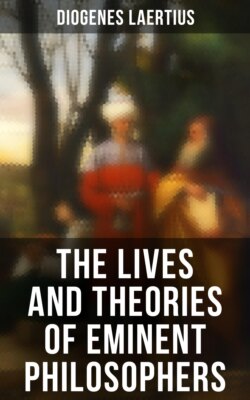Читать книгу The Lives and Theories of Eminent Philosophers - Diogenes Laertius - Страница 25
На сайте Литреса книга снята с продажи.
LIFE OF PERIANDER.
ОглавлениеTable of Contents
I. Periander was a Corinthian, the son of Cypselus, of the family of the Heraclidæ. He married Lyside (whom he himself called Melissa), the daughter of Procles the tyrant of Epidaurus, and of Eristhenea the daughter of Aristocrates, and sister of Aristodemus, who governed nearly all Arcadia, as Heraclides Ponticus says in his Treatise on Dominion and had by her two sons Cypselus and Lycophron, the younger of whom was clever boy, but the elder was deficient in intellect. At a subsequent period he in a rage either kicked or threw his wife down stairs when she was pregnant, and so killed her, being wrought upon by the false accusations of his concubines, whom he afterwards burnt alive. And the child, whose name was Lycophron, he sent away to Corcyra because he grieved for his mother.
II. But afterwards, when he was now extremely old, he sent for him back again, in order that he might succeed to the tyranny. But the Corcyreans, anticipating his intention, put him to death, at which he was greatly enraged, and sent their children to Corcyra to be made eunuchs of; and when the ship came near to Samos, the youths, having made supplications to Juno, were saved by the Samians. And he fell into despondency and died, being eighty years old. Sosicrates says that he died forty-one years before Crœsus, in the last year of the forty-eighth Olympiad. Herodotus, in the first book of his History, says that he was connected by ties of hospitality with Thrasybulus the tyrant of Miletus. And Aristippus, in the first book of his Treatise on Ancient Luxury, tells the following story of him; that his mother Cratea fell in love with him, and introduced herself secretly into his bed; and he was delighted; but when the truth was discovered he became very oppressive to all his subjects, because he was grieved at the discovery. Ephorus relates that he made a vow that, if he gained the victory at Olympia in the chariot race, he would dedicate a golden statue to the God. Accordingly he gained the victory; but being in want of gold, and seeing the women at some national festival beautifully adorned, he took away their golden ornaments, and then sent the offering which he had vowed.
III. But some writers say that he was anxious that his tomb should not be known, and that with that object he adopted the following contrivance. He ordered two young men to go out by night, indicating a particular road by which they were to go, and to kill the first man they met, and bury him; after them he sent out four other men who were to kill and bury them. Again he sent out a still greater number against these four, with similar instructions. And in this manner he put himself in the way of the first pair, and was slain, and the Corinthians erected a cenotaph over him with the following inscription:—
The sea-beat land of Corinth in her bosom,
Doth here embrace her ruler Periander,
Greatest of all men for his wealth and wisdom.
We ourselves have also written an epigram upon him:—
Grieve not when disappointed of a wish,
But be content with what the Gods may give you—
For the great Periander died unhappy,
At failing in an object he desired.
IV. It was a saying of his that we ought not to do anything for the sake of money; for that we ought only to acquire such gains as are allowable. He composed apophthegms in verse to the number of two thousand lines; and said that those who wished to wield absolute power in safety, should be guarded by the good will of their countrymen, and not by arms. And once being asked why he assumed tyrannical power, he replied, “Because, to abdicate it voluntarily, and to have it taken from one, are both dangerous.” The following sayings also belong him:—Tranquillity is a good thing.—Rashness is dangerous.—Gain is disgraceful.—Democracy is better than tyranny.—Pleasures are transitory, but honour is immortal.—Be moderate when prosperous, but prudent when unfortunate.—Be the same to your friends when they are prosperous, and when they are unfortunate.—Whatever you agree to do, observe.—Do not divulge secrets.—Punish not only those who do wrong, but those who intend to do so.
V. This prince was the first who had body-guards, and who changed a legitimate power into a tyranny; and he would not allow any one who chose to live in his city, as Euphorus and Aristotle tell us.
VI. And he flourished about the thirty-eighth Olympiad, and enjoyed absolute power for forty years. But Sotion, and Heraclides, and Pamphila, in the fifth book of her Commentaries, says that there were two Perianders; the one a tyrant, and the other a wise man, and a native of Ambracia. And Neanthes of Cyzicus makes the same assertion, adding, that the two men were cousins to one another. And Aristotle says, that it was the Corinthian Periander who was the wise one; but Plato contradicts him. The saying—“Practice does everything,” is his. He it was, also, who proposed to cut through the Isthmus.
VII. The following letter of his is quoted:—
